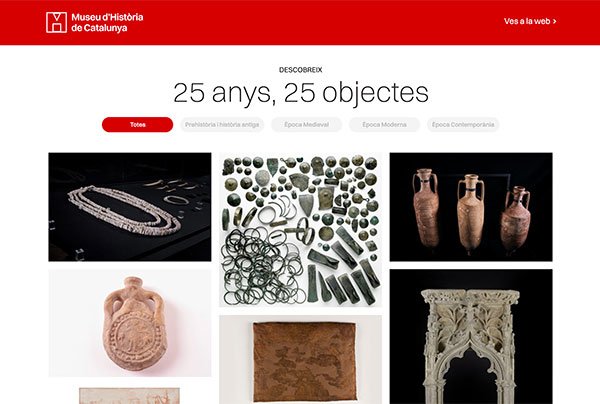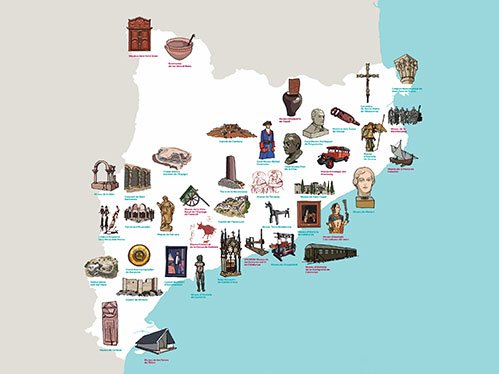Al canviar d'idioma no tots els continguts estan traduïts
The website is not fully translated
Al cambiar de idioma no todos los contenidos están traducidos
Al canviar d'idioma no tots els continguts estan traduïts
 Opening times
Opening times
 Location
Location
 Tickets
Tickets
 Admissions
Admissions
Opening times
Tuesday to Saturday, 10am to 7pm
Wednesdays, 10am to 8pm
Sundays and public holidays, 10am to 2.30pm
The ticket office and entrance are closed 30 minutes before closing time
CLOSED: Mondays that are not bank holidays, 1 and 6 January, 1 May, 18 May, 1 June, 25 and 26 December
Location
Address
Plaça de Pau Vila, 3
08039 Barcelona
Coordinates: 41.380900, 2.185693
Contact
932 254 700
mhc.cultura@gencat.cat
Fax 932 254 758
Group and school bookings:
932 254 244
Monday to Thursday: 10am-2pm and 3.30-5.30pm
Friday: 9.30am-2pm
mhcvisites.cultura@gencat.cat
Transport and access routes
Public transport
Buses V17, H14, D20, V15, V13, 39, 45, 51, 59 and 120
Metro L4 (yellow) Barceloneta
Train to Barcelona Estació de França
Barcelona Tourist Bus: red line; and Barcelona City Tour: eastern route; Museu d’Historia de Catalunya stop.
Parking
There are three paid-for car parks nearby: in Passeig Joan de Borbó, Moll d’Espanya and Moll de la Fusta.
Coaches have parking spaces available near the museum building.
“Bicing” bicycle hire in Plaça Pau Vila.
Admissions
Permanent exhibition
Temporary exhibitions
General admission: 4 euros
Reduced admission: 3 euros
Combined ticket
Permanent exhibition + temporary exhibition
General admission: 8 euros
Reduced admission: 6 euros
 Opening times
Opening times
 Location
Location
 Tickets
Tickets
 Admissions
Admissions
Opening times
Tuesday to Saturday, 10am to 7pm
Wednesdays, 10am to 8pm
Sundays and public holidays, 10am to 2.30pm
The ticket office and entrance are closed 30 minutes before closing time
CLOSED: Mondays that are not bank holidays, 1 and 6 January, 1 May, 18 May, 1 June, 25 and 26 December
Location
Address
Plaça de Pau Vila, 3
08039 Barcelona
Coordinates: 41.380900, 2.185693
Contact
932 254 700
mhc.cultura@gencat.cat
Fax 932 254 758
Group and school bookings:
932 254 244
Monday to Thursday: 10am-2pm and 3.30-5.30pm
Friday: 9.30am-2pm
mhcvisites.cultura@gencat.cat
Transport and access routes
Public transport
Buses V17, H14, D20, V15, V13, 39, 45, 51, 59 and 120
Metro L4 (yellow) Barceloneta
Train to Barcelona Estació de França
Barcelona Tourist Bus: red line; and Barcelona City Tour: eastern route; Museu d’Historia de Catalunya stop.
Parking
There are three paid-for car parks nearby: in Passeig Joan de Borbó, Moll d’Espanya and Moll de la Fusta.
Coaches have parking spaces available near the museum building.
“Bicing” bicycle hire in Plaça Pau Vila.
Admissions
Permanent exhibition
Temporary exhibitions
General admission: 4 euros
Reduced admission: 3 euros
Combined ticket
Permanent exhibition + temporary exhibition
General admission: 8 euros
Reduced admission: 6 euros
Defeat and recovery: 1940 to 1980
Once the Civil War was over, the Francoist regime (1939-1975) caused the exile of thousands of citizens and began severe repression against Catalan nationalist and left-wing movements. Proof of this is the execution by firing squad of the Catalan President, Lluís Companys. The policy of autarchy and the consequences of the war led to economic collapse and poverty.
In its initial stage, the dictatorship was similar to the fascist regimes in Italy and Germany, but in the context of the Cold War it began a discreet rapprochement with the international community and a process of increasing economic openness. The entry of foreign capital, the diversification of industry, and the arrival of tourism led to the take-off of the Catalan economy and the arrival of thousands of workers from other regions of Spain.
Opposition to the regime, which began in 1939, was reorganised and achieved a considerable presence among ordinary people by the beginning of the seventies. After the dictator’s death, a new democratic Constitution (1978) and a new Statute of Autonomy (1979), marked the beginning of the recovery of freedom and democracy.

The long post-war period
The Republican defeat had devastating consequences for Catalonia. Most of the political class, intellectuals, trade union and workers’ movement leaders, and a large number of people were forced into exile. In Catalonia, the Francoist army applied harsh repression, including the execution by firing squad in 1940 of the President of the Generalitat of Catalonia, Lluís Companys.
The symbols of the Catalan nationalist movement were persecuted, while a new political regime was imposed, inspired by fascism but with deep Catholic roots. Francisco Franco concentrated all the powers of a totalitarian State based on the existence of an official ideology and a single party. Economic poverty was suffocating the country until well into the 1960s.
Portrait of Lluís Companys, by José Chavez Morada, 1940
In 1934, Lluís Companys, a lawyer from a working-class and farming background and leader of Esquerra Republicana de Catalunya, succeeded Francesc Macià as President of the Generalitat. During the Civil War, the Generalitat, loyal to the Republic, organised civil defence. With the entry of the Francoist troops into Barcelona, Companys went into exile in France. Arrested by the Gestapo, he was extradited to Madrid. On 3 October 1940 he was moved to Montjuïc castle in Barcelona and on 14 October he was court martialled. At 6.30 the next morning, he was executed by firing squad.

In 1934, Lluís Companys, a lawyer from a working-class and farming background and leader of Esquerra Republicana de Catalunya, succeeded Francesc Macià as President of the Generalitat. During the Civil War, the Generalitat, loyal to the Republic, organised civil defence. With the entry of the Francoist troops into Barcelona, Companys went into exile in France. Arrested by the Gestapo, he was extradited to Madrid. On 3 October 1940 he was moved to Montjuïc castle in Barcelona and on 14 October he was court martialled. At 6.30 the next morning, he was executed by firing squad.
Francoist schools









National Catholicism
© de la fotografia: MHC (Gerard Ruiz Valls)


Teachers
© de la fotografia: MHC (Gerard Ruiz Valls)


Discipline
© de la fotografia: MHC (Gerard Ruiz Valls)

The economic growth of the sixties
From the sixties onwards, the Catalan economy and society underwent far-reaching transformation. With the promulgation of the Stabilisation Plan in July 1959, the regime abandoned the model of autarchy, in force for 20 years. The liberalisation of trade and the re-establishment of the free market in foreign currency came at a time of expansion of the European economy.
Catalan industry became a supplier of consumer goods for the Spanish market and underwent tremendous growth. This led to the mass arrival of workers from other regions of Spain. Expansion took place without town planning or democratic control over the economic model. These failings continued to be felt in subsequent decades.
Standards of living and motorisation
A symbol of the new purchasing power brought by the economic expansion was motorisation: instead of a luxury item, the car became a mass consumer item. The extension of consumption focused on utilitarian items, domestic appliances and home ownership. In 1946, Hispano-Suiza became ENASA, a new company controlled by the INE. Pegasus trucks were among its most popular products. The SEAT factories, opened in 1954, produced various models, most importantly the 600, the ultimate utility car. The first toll motorways were opened in 1969, beginning with the route from Barcelona to Mataró.

A symbol of the new purchasing power brought by the economic expansion was motorisation: instead of a luxury item, the car became a mass consumer item. The extension of consumption focused on utilitarian items, domestic appliances and home ownership. In 1946, Hispano-Suiza became ENASA, a new company controlled by the INE. Pegasus trucks were among its most popular products. The SEAT factories, opened in 1954, produced various models, most importantly the 600, the ultimate utility car. The first toll motorways were opened in 1969, beginning with the route from Barcelona to Mataró.
The Bar









Telephone


Bar football


Television

The wave of immigration
The economic development and agricultural crisis generated migratory flows throughout Spain. Emigrants left the most depressed areas for various destinations. Thousands of Andalusians, Castilians, Extremadurans, Murcians and Galicians arrived in Catalonia needing to find work and facing the difficulty of adapting to new surroundings.
The arrival of these migrants had a very great impact on Catalan society, particularly in the metropolitan areas. Some towns and cities doubled their populations within a few years. Soon, the “other Catalans”, as defined by the writer Francesc Candel, began to identify with the country and make a decisive contribution to building a shared future.
Arrival of immigrants
Anti-Francoism
From the sixties onwards, movements opposing the regime emerged from their isolation, uniting increasingly broad sectors of society. The incorporation of new generations who had not experienced the war and the changes experienced by the world and by Catalan society generated a plural movement demanding the return of freedom, democracy and autonomy.
Despite the opening up of the regime and the timid rapprochement with the international community, there was no doubt about the lack of civil liberties in Francoist Spain. The establishment of the Assembly of Catalonia (1971), bringing together a wide variety of anti-Francoist groups, from Communists to conservative nationalists, was vitally important for the political future of the country.
L'estaca


Què volen aquesta gent? Maria del Mar Bonet
Song denouncing Francoist repression, composed by Maria del Mar Bonet in 1968 based on a poem by Lluís Serrahima.
The recovery of autonomy
The first democratic elections after the death of the dictator, in June 1977, gave a majority in Catalonia to forces demanding autonomy and the re-establishment of the Generalitat. On 11 September that year, a million Catalans demonstrated with the same demand. These two factors forced the re-establishment of the provisional Generalitat and the return from exile of its President, Josep Tarradellas.
The Statute of Autonomy of Catalonia, in force since 1979, was the result of arduous negotiations between the Catalan political forces and the Spanish government. In 1979, the Spanish parliament approved the text, which was confirmed in a referendum by the Catalan people. The Spanish Constitution of 1978, also approved by a referendum, and the development of the State of the Autonomous Communities, began a new period of democracy and institutional stability.
Jordi Pujol, President of the Generalitat
Opening times
Tuesday to Saturday, 10am to 7pm
Wednesdays, 10am to 8pm
Sundays and public holidays, 10am to 2.30pm
The ticket office and entrance are closed 30 minutes before closing time
CLOSED: Mondays that are not bank holidays, 1 and 6 January, 1 May, 18 May, 1 June, 25 and 26 December
Location
Address
Plaça de Pau Vila, 3
08039 Barcelona
Coordinates: 41.380900, 2.185693
Contact
932 254 700
mhc.cultura@gencat.cat
Fax 932 254 758
Group and school bookings:
932 254 244
Monday to Thursday: 10am-2pm and 3.30-5.30pm
Friday: 9.30am-2pm
mhcvisites.cultura@gencat.cat
Transport and access routes
Public transport
Buses V17, H14, D20, V15, V13, 39, 45, 51, 59 and 120
Metro L4 (yellow) Barceloneta
Train to Barcelona Estació de França
Barcelona Tourist Bus: red line; and Barcelona City Tour: eastern route; Museu d’Historia de Catalunya stop.
Parking
There are three paid-for car parks nearby: in Passeig Joan de Borbó, Moll d’Espanya and Moll de la Fusta.
Coaches have parking spaces available near the museum building.
“Bicing” bicycle hire in Plaça Pau Vila.
Admissions
Permanent exhibition
Temporary exhibitions
General admission: 4 euros
Reduced admission: 3 euros
Combined ticket
Permanent exhibition + temporary exhibition
General admission: 8 euros
Reduced admission: 6 euros




 Twitter
Twitter Facebook
Facebook

